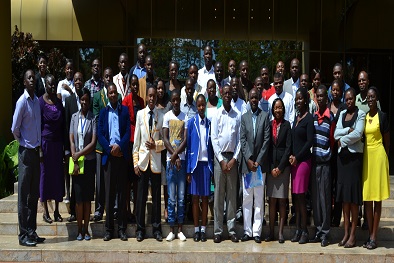The youth water forum brought together 40 representatives from youth networks, organisations (government, NGOs and other civil society) and groups fromprimary, secondary and tertiary education institutions to map the way forward for youth involvement in the water sector. The forum aimed at developing a national action plan for the implementation of the AMCOW Policy and Strategy on Mainstreaming Youth in the Water and Sanitation Sector and SADC Youth Strategy and also solicits input into the RSAP IV.
The National Youth Focal Point, Mr Donald Rwasoka gave an overview of the countries’ youth organisations in water, sanitation and environment sectors and highlighted on the activities the organisations are undertaking. Some of the activities include clean-up campaigns, tree planting, awareness campaigns and commemorations of international water, sanitation and environmental days.
A representative from the Ministry of Environment Water and Climate, Mr Zvikomborero Manyangadze also gave an overview of the country’s water resources highlighting on the opportunities, challenges, successes and the importance of youth involvement in water resources management. Additionally, Waternet a SADC subsidiary institution for human capacity development, presented on capacity development opportunities available for the youths. Dr K. Msibi from the SADC Secretariat gave the keynote address and he highlighted on the need for an institutionalised and operational youth water entity.
The youth deliberations resulted in a list of priority actions that will form the country’s youth input into the Regional Action Plan and in turn the youth input into the RSAP IV. Some of the identified actions are:
(i) Mainstreaming of youths in water governance structures in Zimbabwe
(ii) Facilitate mentorship of youths
(iii) Capacity building for the youth
(iv) Promote innovation in water technology
(v) Youth Water Awards
Furthermore, a task force to facilitate the establishment of the youth water entity was set up and plans are already underway. This forum ensured that the youth as a large, vulnerable and marginalized segment of the population are given a voice in decision-making.
